The Democratic Republic of the Congo (DRC), rich in mineral resources, particularly cobalt, has become a focal point in the global discourse surrounding the energy transition. As the world pivots towards electric vehicles (EVs) and renewable technologies, this resource has gained unprecedented importance due to its role in battery production. However, the narrative surrounding the DRC is often one of exploitation and external interference, particularly by major powers like China, the United States, and European nations. But what is often overlooked is the DRC’s capacity to influence this industry— an asset that remains largely untapped for its people.
Recent studies have illuminated the interplay between the DRC’s mining policies and global cobalt supply chains. Our research involved an extensive examination of both industrial and artisanal mining practices within the DRC, coupled with an analysis of China’s burgeoning cobalt processing industry. The data collected was not only quantitative; local media, government documents, and fieldwork provided a nuanced understanding of the DRC’s governance and economic strategies. It became evident that while the DRC possesses significant leverage as the world’s leading cobalt producer, the social benefits stemming from this control remain limited.
Despite its mineral wealth, approximately 74% of the DRC’s population lives in poverty, revealing a stark contradiction between resource potential and human development. Even as the global demand for cobalt skyrockets, communities near mining sites report negligible improvements in living conditions. They grapple with the grim realities of polluted environments and health hazards from unsafe mining practices. A historical analysis indicates that this exploitation isn’t new; the DRC has a long legacy of plunder dating back to its colonization by Belgium, setting a precedent that continues to echo in modern times.
China’s role in the cobalt market is pivotal, accounting for 65% of historic cobalt processing. The swift advancement of Chinese industries, particularly in electric vehicle batteries, has positioned them as both benefactors and exploiters, depending on the lens through which one views their actions. Chinese corporations such as Huayou Cobalt, CATL, and BYD have rapidly established themselves as leaders in the global market. However, the recent suspension of cobalt exports from one of the largest Chinese-owned mines in the DRC exemplifies how local politics can directly impact global supply. This disruption, which accounted for nearly 10% of global cobalt production, signifies the DRC’s latent power within this domain.
Shifts in local governance, like the appointment of Fifi Masuka Saini in the Lualaba province, can lead to significant upheaval in production and investment strategies. This political maneuvering has implications not just for local businesses but also for international players who must navigate the complexities of DRC governance. Recent tension between provincial interests and national policies showcases the fragmented nature of governance that complicates mining operations. The establishment of new regulations for artisanal mining has yet to yield clear outcomes, leading to standstill situations that jeopardize both local livelihoods and international cobalt supply.
On the ground, the conditions faced by artisanal miners paint a grim picture of the industry. Approximately 150,000 individuals toil under hazardous conditions, with a staggering number, including children, involved in laborous tasks that expose them to life-threatening risks. Current exploitative practices within cooperatives have seen miners lose nearly half of their earnings to profit-driven leaders often linked to corrupt political systems. In light of the burgeoning cobalt market, this ethical crisis within artisanal mining complicates discussions around equitable resource management.
The transition to a cleaner energy future must involve a recalibration of how nations like the DRC are perceived within global supply chains. Instead of merely being viewed as suppliers of raw materials, there lies an opportunity for collaborative partnerships that empower local populations. This can be achieved through equitable contracts, investments in domestic processing capabilities, and local supply chain development. As consumer countries heighten their demand for EVs, recognizing and elevating the voices of DRC’s mineral-producing communities will be essential in crafting a holistic approach to sustainable energy transitions.
The complexities of the cobalt industry in the DRC manifest larger questions surrounding global economic frameworks and resource governance. By acknowledging the DRC’s potential for influence and the perils faced by its mining communities, stakeholders can forge pathways toward a more equitable future. The stakes are high, and the urgency for meaningful engagement has never been greater. Transitioning to a clean energy paradigm invites not just technological change but also a moral imperative to uplift those who provide the foundational resources for our future.


Leave a Reply